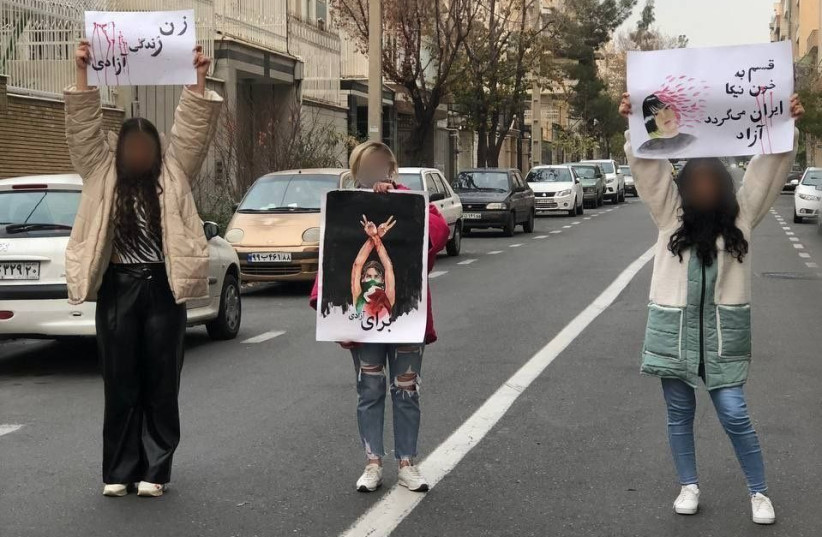Over a dozen Iranian civil rights activists have been arrested by authorities ahead of the anniversary of the killing of Mahsa Amini by "morality police" in Tehran on September 16, Iranian opposition media reported over the weekend.
Amini’s death in September 2022 sparked nationwide protests often referred to as the "Women, Life, Freedom" protests that swept across Iran for months, only declining in January. Protests have periodically renewed in several locations in the months since then.
At least 13 activists and relatives of Iranians killed or arrested during the protests which erupted after Amini's death have been arrested in recent weeks, according to Iranian human rights groups.
In the Kurdistan Province, activist Ziba Qlij-Khani, who was arrested during the protests last year, was transferred to Sanandaj prison, according to the Hengaw Human Rights Organization. Hissam and Sirvan Karami, the relatives of a protester killed in the Woman, Life, Freedom protests, were also recently arrested by Iranian intelligence authorities, although the latter was later released.
In the Gilan Province, Matin Yazdani, Forough Sami'nia, Yasmin Hashdari, Jelve Javaheri, Zahra Dadras, Negin Rezaei, Shiva Shahsiah, Vahehdeh Khoshsirat, Houman Taheri, Azadeh Chavoshian, and Sara Jahani were among those arrested, according to the Bidarzani women's rights group.

The Intelligence Department of Gilan Province claimed that 12 Iranians were arrested recently, referring to those arrested as a "team related to foreign elements, which was planning and taking action to incite chaos and vandalism on the anniversary of last fall's riots," according to the Iranian Mehr News Agency.
According to the intelligence department, authorities conducted the arrests in the Gilan Province and the Kurdistan Province. The intelligence department claimed that two of those arrested were trained by "the enemy's intelligence services" abroad.
In Ilam in western Iran, an activist named Aryan Koukhaei who was arrested during the Woman, Life, Freedom protests was arrested earlier this month and transferred to a prison in the area, according to Hengaw.
Additional activists have been summoned and arrested by Iranian authorities across the country in recent days and weeks, as Iranian officials express concerns that protests will renew on the anniversary of Amini's death.
The US Special Envoy for Iran Abram Paley tweeted on Saturday: "Following with concern reports of numerous arrests in connection with peaceful protests. The world is watching and will hold the Iranian regime accountable for disregarding human rights and fundamental freedoms."
“Iranian authorities are using their go-to playbook of putting maximum pressure on peaceful dissidents ahead of the anniversary of Mahsa Amini’s death,” said Tara Sepehri Far, senior Iran researcher at Human Rights Watch, on Saturday. “The arbitrary arrests of a dozen activists are aimed at suppressing popular discontent with ongoing impunity and rights violations.”
Iranian officials express concerns about renewed protests on Mahsa Amini's anniversary
Earlier this month, the commander-in-chief of the Islamic Revolutionary Guard Corps (IRGC) Hossein Salami stated that the protests sparked after the murder of Mahsa Amini by Tehran's "morality police" were "the strongest, most dangerous, and most serious" such protests in Iran.
Salami additionally referred to the protests as "the most unequal and broadest global fight against Iran's Islamic system," claiming that "the enemy was defeated in this heavy fight," according to the IRGC-affiliated Tasnim News Agency.
The IRGC commander also accused "the enemy" (usually a reference to the US and Israel) of planning to spark new protests on the anniversary of Amini's death.
In July, Mostafa Rostami, the representative of Iranian Supreme Leader Ali Khamenei for universities, stated about the protests last year that "it is not an exaggeration to say that the enemies launched the most complex combined war in history against Iran," claiming that efforts were being made by Iran's enemies to focus on launching protests in universities, according to statements cited by Iranian media.
Last month, Iran’s police force announced that it would be returning “morality police” patrols to the streets to enforce hijab laws, after about half a year in which the operations of the force were replaced with cameras and other technological measures.
